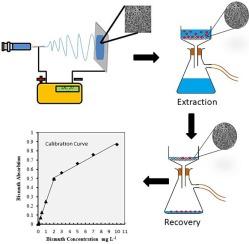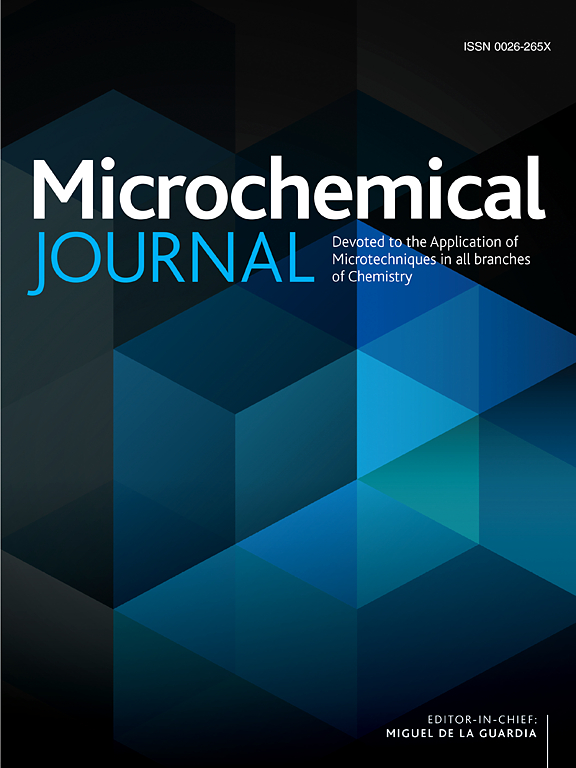Aliquat® 336负载聚(偏氟乙烯-六氟丙烯)电纺纳米纤维盘在火焰原子吸收光谱法检测低浓度Bi(III)时的不同应用
IF 4.9
2区 化学
Q1 CHEMISTRY, ANALYTICAL
引用次数: 0
摘要
这是首次报道在过滤装置中插入电纺纳米纤维盘作为低浓度金属分析预浓缩策略的潜力。纳米纤维包括 60% 的聚(偏氟乙烯-六氟丙烯)(PVDF-HFP)和 40% 的离子液体 Aliquat® 336。电纺过程的电压为 16 kV,注射速率为 1 mL h-1,针尖位置与鼓式收集器的距离为 10 cm。将制备好的纳米纤维圆片置于过滤装置中,通过控制流速(3.3 mL s-1),从纳米纤维圆片内部导入 200 mL 含有 1 mg Bi(III)的盐酸溶液(浓度为 0.5 mol/L)。用 10 mL 0.2 mol/L 的乙二胺四乙酸和氢氧化铵混合溶液洗脱吸附的 Bi(III),然后用火焰原子吸收光谱法进行分析。所引入的技术(基于纳米纤维盘的固相萃取)可用于 4-2000 µg/L 的铋浓度范围,检测限为 1.2 µg/L。对于 100 µg/L 的铋溶液,测定的日间和日内相对标准偏差(3 天,n = 7)分别为 1.1 % 和 2.4 %。该方法的预浓缩倍数为 200 倍。制备的纳米纤维盘至少连续使用了 7 次预浓缩实验。所提出的方法对 Bi(III)具有良好的选择性,可用于实际样品中 Bi(III)的测定。本文章由计算机程序翻译,如有差异,请以英文原文为准。

A different application of the Aliquat® 336 loaded poly(vinylidene fluoride-co-hexafluoropropylene) based electrospun nanofibers disks for the preconcentration followed by flame atomic absorption spectrometry detection of low-level Bi(III)
It is the first report on the potential of electrospun nanofiber disks inserted in a filtration apparatus as a preconcentration strategy for the analysis of low-level metals. The nanofibers included 60 wt% of poly(vinylidene fluoride-co-hexafluoropropylene) (PVDF-HFP) and 40 wt% of ionic liquid Aliquat® 336. The electrospinning process was done by applying a voltage of 16 kV, an injection rate of 1 mL h−1, and 10 cm distance of the needle tip location from the drum collector. A circular piece of the prepared nanofiber disks was placed in a filtration apparatus, and 200 mL solution containing 1 mg of Bi(III) adjusted to 0.5 mol/L of hydrochloric acid was transmitted from inside the nanofiber disk by controlling the flowrate (3.3 mL s−1). The adsorbed Bi(III) was eluted by 10 mL of 0.2 mol/L solution of ethylendiaminetetraacetic acid and ammonium hydroxide mixture, and then was analyzed by flame atomic absorption spectrometry. The introduced technique (nanofiber disks-based solid phase extraction) can be used in the bismuth concentration range of 4–2000 µg/L, with a limit of detection 1.2 µg/L. The determined inter- and intra-day relative standard deviations (3 days and n = 7) for a solution of 100 µg/L of bismuth were 1.1 % and 2.4 %, respectively. The method offers a preconcentration factor of 200-fold. The fabricated nanofiber disks were used at least in 7 consecutive preconcentration experiments. The proposed method was selective towards Bi(III) and can be used satisfactory for its determination in real samples.
求助全文
通过发布文献求助,成功后即可免费获取论文全文。
去求助
来源期刊

Microchemical Journal
化学-分析化学
CiteScore
8.70
自引率
8.30%
发文量
1131
审稿时长
1.9 months
期刊介绍:
The Microchemical Journal is a peer reviewed journal devoted to all aspects and phases of analytical chemistry and chemical analysis. The Microchemical Journal publishes articles which are at the forefront of modern analytical chemistry and cover innovations in the techniques to the finest possible limits. This includes fundamental aspects, instrumentation, new developments, innovative and novel methods and applications including environmental and clinical field.
Traditional classical analytical methods such as spectrophotometry and titrimetry as well as established instrumentation methods such as flame and graphite furnace atomic absorption spectrometry, gas chromatography, and modified glassy or carbon electrode electrochemical methods will be considered, provided they show significant improvements and novelty compared to the established methods.
 求助内容:
求助内容: 应助结果提醒方式:
应助结果提醒方式:


